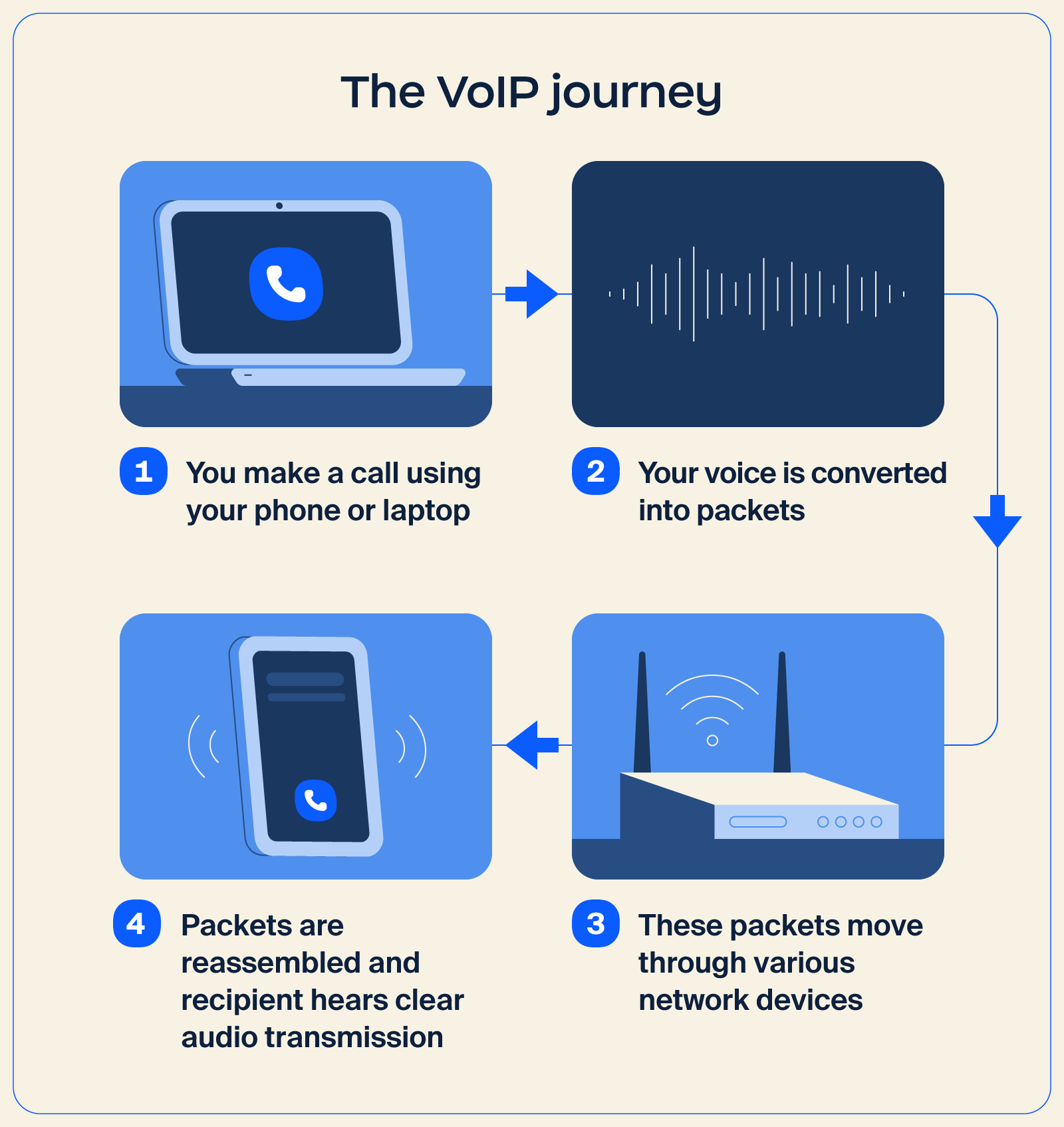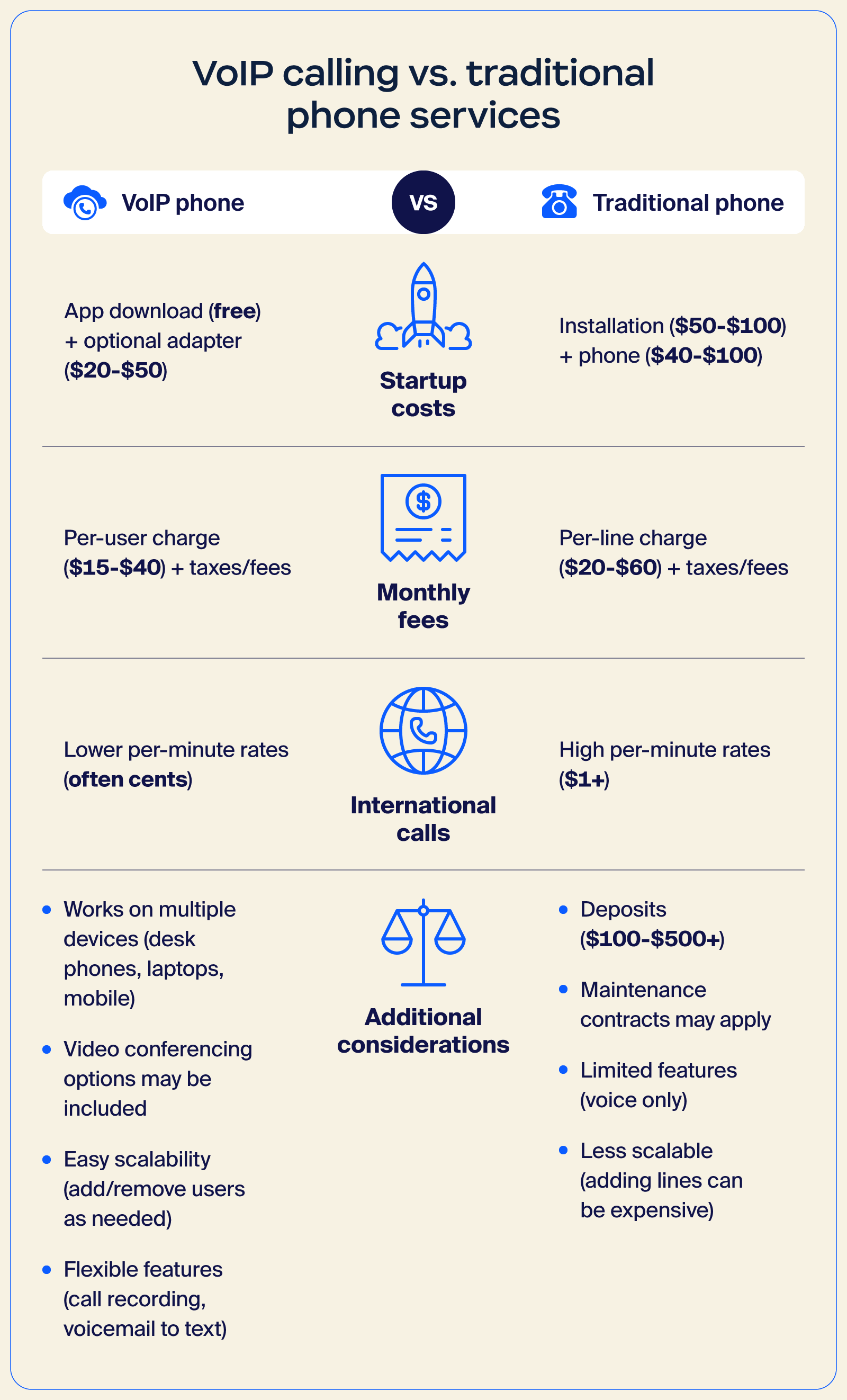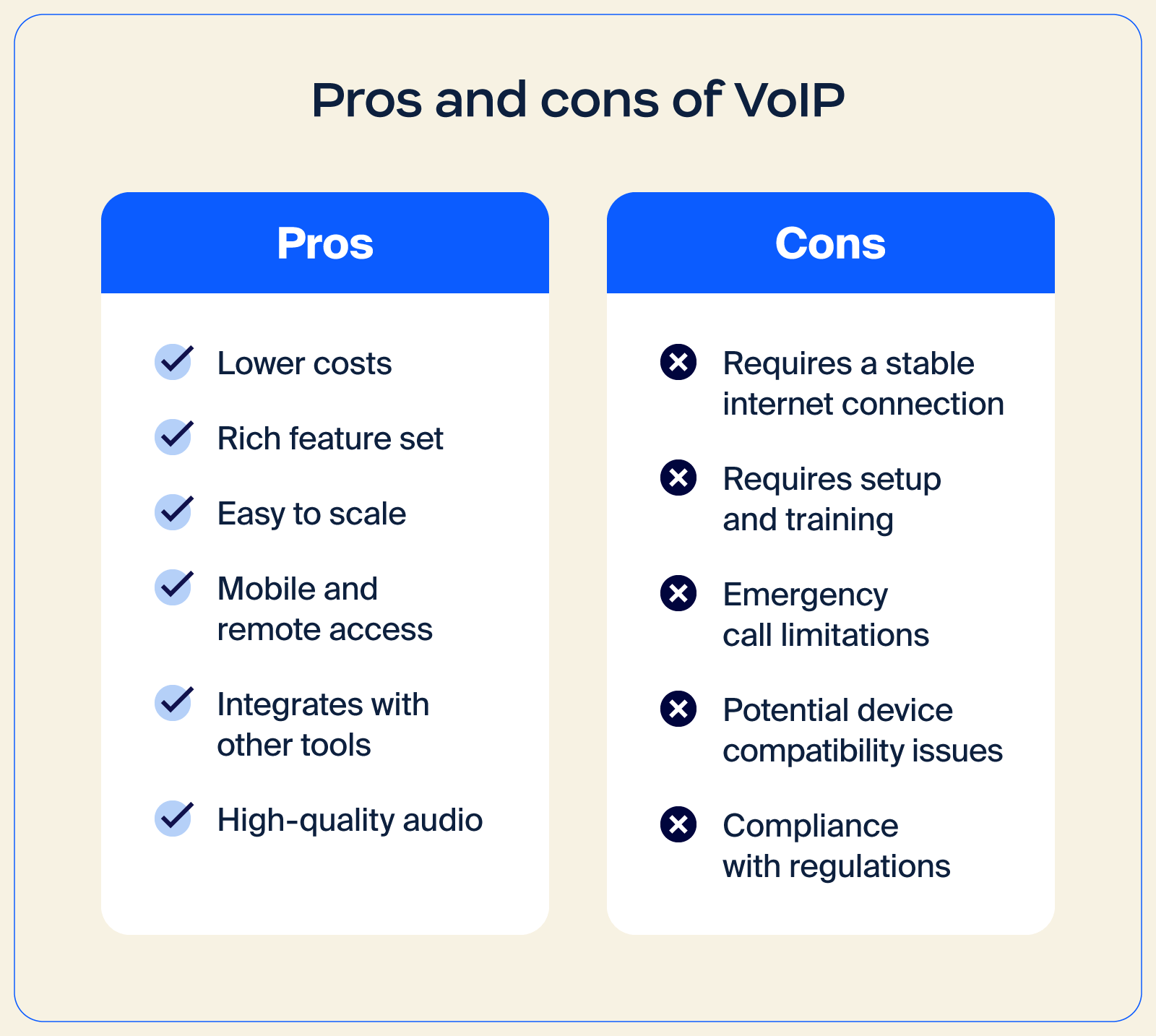
Meet Zoom AI Companion, your new AI assistant!
Boost productivity and team collaboration with Zoom AI Companion, available at no additional cost with eligible paid Zoom plans.
Updated on December 11, 2025
Published on December 11, 2025


| VoIP stands for Voice over Internet Protocol, a technology that enables phone calls using the internet instead of traditional phone lines. Unlike regular phones, VoIP turns your voice into data and sends it over the internet rather than relying on physical wires. |
Traditional phone systems can be a hassle. They’re often expensive and inflexible, and they lack the modern features today’s businesses need. Luckily, the days of relying solely on traditional phone systems for communication are long gone. Voice over Internet Protocol (VoIP) has revolutionized the way we connect, offering a flexible, cost-effective, and feature-rich alternative that sends voice data over the internet rather than through physical phone lines.
Whether you’re a startup looking to cut costs or a large enterprise aiming to boost efficiency, VoIP has something to offer. In this post, we’ll explore all the essential information about VoIP, including what VoIP is, how it works, pros and cons, and key features to look for in a VoIP system.
VoIP is a technology that lets you make phone calls using the internet instead of traditional phone lines. Unlike regular phones, which rely on physical wires, VoIP turns your voice into data and sends it over the internet to the person you’re calling. It works similarly to sending an email but uses your voice instead of text.
In a VoIP setup, the organization typically manages and maintains its own VoIP system, which includes the necessary hardware, software, and infrastructure. In the case of hosted VoIP, the provider manages the system. Both of these options can make communication cheaper and more flexible for businesses.

You know voice over IP lets you make calls using the internet rather than traditional phone lines, but how does VoIP actually work? We delve into the specifics below.
When it comes to communication options for your business, VoIP and traditional phone services are two prominent contenders. Let’s take a closer look at how they stack up.

Looking for a VoIP phone system that meets all your communication needs? Here are some features that can make your business communication easier:
Imagine having all your communication tools in one place. With unified communications, you get seamless integration of meetings, phone, and team chat. It’s like having a supercharged command center for your team’s collaboration efforts.
Say goodbye to missed calls and hello to a virtual receptionist who greets your callers professionally and directs them to the right person or department. It’s a helpful assistant managing your calls 24/7, routing customers to the services they need.
Stay connected on the go with desktop and mobile compatibility. Whether you’re at your desk or out and about, you can access your VoIP phone system from any compatible device, so you don’t miss important calls.
Protect your sensitive communications with encryption and robust security measures. It’s like a secure vault for your calls, keeping your conversations private and confidential.
Experience crystal-clear call quality that sounds like you’re talking face-to-face. With high-definition audio, you can communicate with clarity and confidence, making every conversation a breeze.
With Zoom Phone’s comprehensive suite of calling features, you can enjoy the benefits of a flexible and mobile cloud phone system without compromise. You can even streamline your workflows with seamless integrations, enhance productivity with AI-driven tools like post-call summaries and voicemail task extraction, and experience crystal clear communications with HD voice quality.
Plus, with features like call recording, voicemail transcription, and mobile app access, managing your business communications has never been easier.
VoIP can transform your business communication. Here’s how:
While VoIP offers numerous benefits, it also comes with some drawbacks and limitations. Let’s explore some of the challenges you may encounter:

When you decide to invest in VoIP, it can be tricky to decide which provider to use. There are many options on the market, so how do you know which is the right choice for your organization?
Here are a few things to consider as you assess your options:
For example, if you have a small business that just needs phones for voice calls, you likely need a provider that caters to small businesses. On the other hand, a large-scale call center may require a broader communications package, so look for a provider that includes virtual call center features.
When designing a flexible work model, you want to enhance your team’s connectivity and bridge any distance created by physical separation. That means leveraging the right communication software. In fact, traditional landlines are being phased out in the U.S., so it’s a smart idea to consider a switch to VoIP now.
Zoom Phone, our cloud-based VoIP phone service, optimizes workflows with a unified platform for phone, chat, meetings, and more across desktop and mobile devices. Plus, its AI-driven features, including post-call summaries, voicemail task extraction, and voicemail prioritization, streamline workflows, prioritize tasks, and improve communication management.
Zoom Phone also integrates with other tools in Zoom Workplace, an AI-first collaboration platform. Reach out today to see how Zoom Phone can transform your business’s connectivity and collaboration.
Still have questions about VoIP? We’ve got answers! Let’s dive into some common queries.
Voice over IP costs vary depending on factors like the service provider, features, and the number of users. Typically, VoIP offers cost savings compared to traditional phone services, with lower monthly fees and reduced long-distance charges. However, there may be initial setup costs for equipment and infrastructure.
Yes, many cell phones can use VoIP for voice communication with apps like Zoom Workplace. When a cell phone is connected to Wi-Fi, these apps leverage VoIP technology to make calls over the internet instead of traditional cellular networks, offering potential cost savings and enhanced features.
In most cases, yes! VoIP providers typically offer number porting services, allowing you to transfer your existing phone number to the VoIP system. This means you can keep your familiar phone number while enjoying the benefits of VoIP. Similarly, when porting to a Skype number, this feature allows you to maintain your existing contacts seamlessly, which is crucial for ensuring continuity in your personal or professional communications.
VoIP security measures can vary depending on the service provider and implementation. While VoIP offers encryption and security features to protect your communications, it’s important to implement best practices like keeping software up to date.